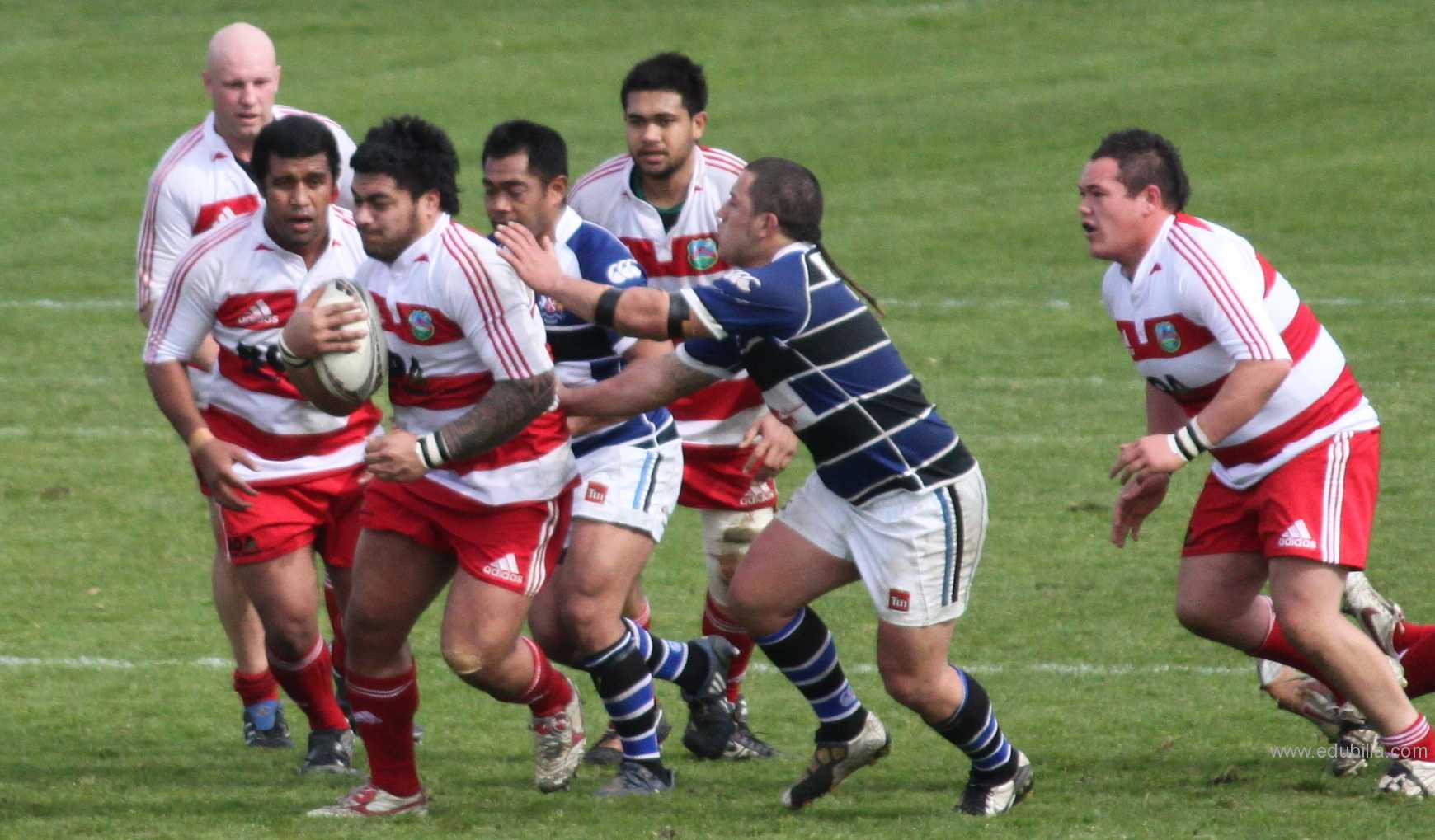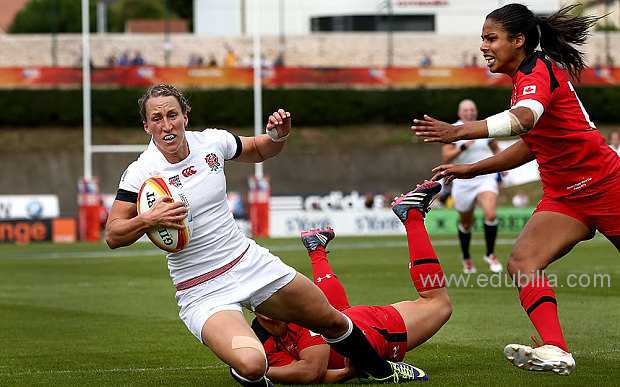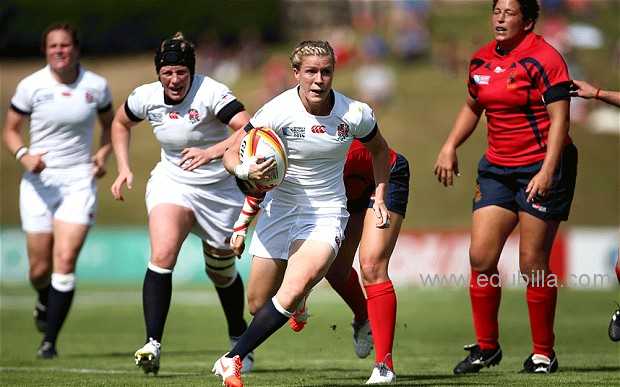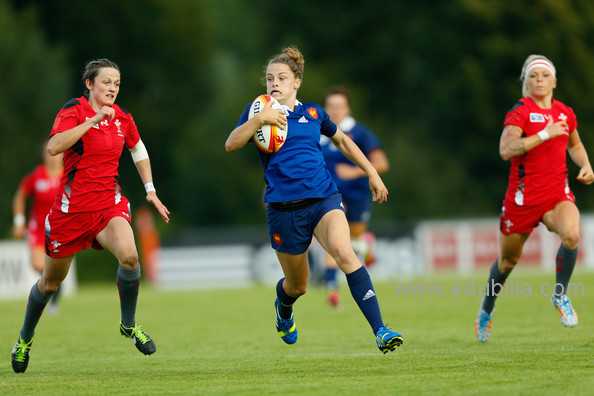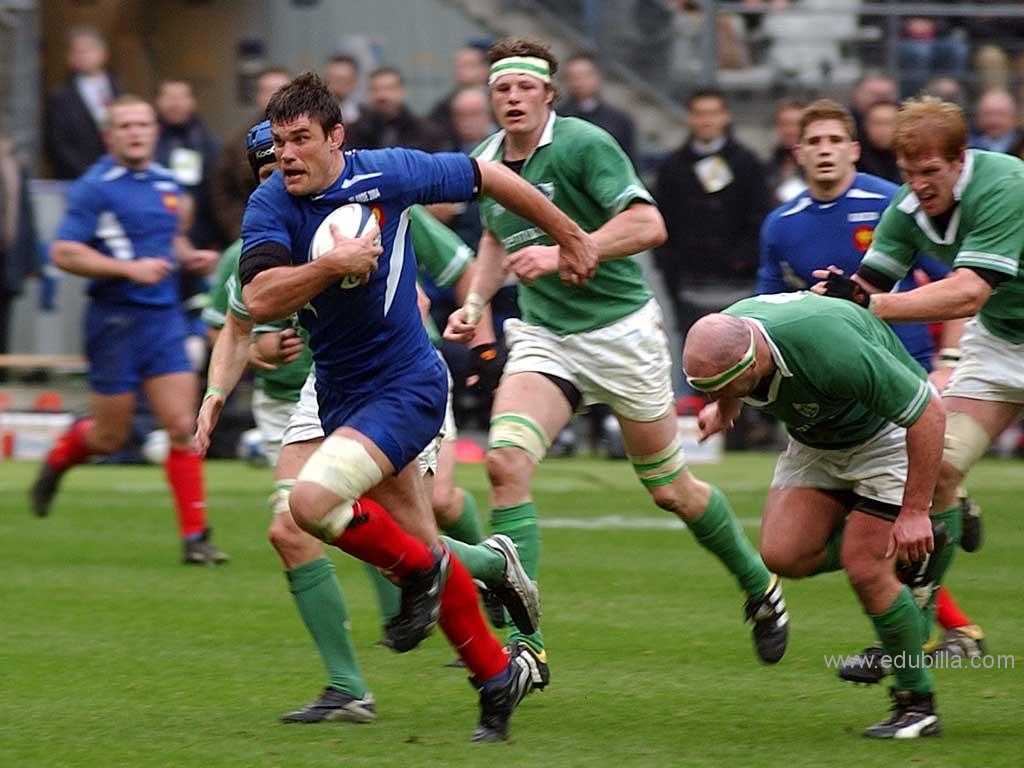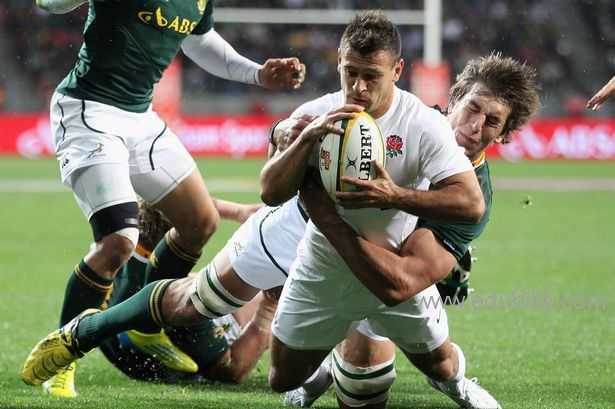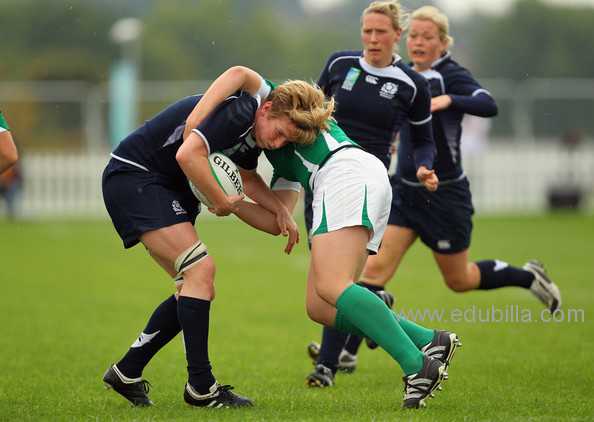
Overview Of Rugby Football
Rugby football is a style of football that developed at Rugby School and was one of many versions of football played at English public schools during the 19th century.The two main types of rugby are rugby league and rugby union. Although these two forms share the same objective of getting the ball over the line to score a try, the specific rules are different.
Game Rules
Some rules are necessary to know but very complex and technical. So it's best to include just the most important parts of them when getting together basic rules.
1 Grounds
Rugby grounds have lines everywhere! Some solid, some dashed. What do they all mean and which are most important?
Get to know more about the basics by learning about the field, also known as the pitch.
Easy, step by step, know the rugby field , some associated rules and additional interesting information.
2 Equipment
It's not round so it's a bit of a weird shape for a ball!
True, but it does make the game pretty interesting.
Get to know the ball so you catch it well or predict where it is going to bounce and where it will go after it bounces.
3 Players
One of the simple rules - maximum of 15 players in a team, with up to 7 substitutes allowed.
4 Clothing and footwear for playing
Rugby gear is shirt, shorts, underwear, socks and boots! - talk to current players for advice on kit. Some minimal padding is allowed.
Boots are probably the most important item. Before buying them, you may like to read this
Safety and comfort are most important. Keep in mind...
IRB reregulations state that stud length must not exceed 21mm and studs should not 'burr' (create sharp edges when worn down)forwards play close together and often their feet are stood on by other forwards , sturdier boots offer more protectionforwards require good grip for pushing, individual studs may be better than moulded soles
if you have boots with individual screw in studs you can have more than one set of studs and use studs suitable for the surface you are about to play on for speed and agility backs may prefer lighter boots with moulded solesbefore you buy, try on the boots with the same thickness of sock you will be wearing during a game buy from a reputable trader and specify you want 'rugby boots'football (soccer) boots may be suitable but tend to be a lighter construction (offering less protection for your feet)
5 Time - how long is a match:
Two 40 minute halves, maximum of 10 minutes half-time break. Use any existing weather conditions, they may change (just my opinion!)
6 Match Officials - uphold the laws (rules)
Referee and two touch judges. Being a match official is not easy, officials provide a great service and deserve support.Very important. Always remember the spirit of the rules of rugby...
We all make mistakes.What we think we saw/heard is sometimes not what really happened.Just like you, the Match officials are doing their best
Play to the whistle; it may be your advantage.
7 Mode
Players running all over the place! What's going on?.This law lays out a few details of what you can do in a match.
In a few lines it explains that any player who is 'onside' can get the ball, run with it, kick, pass or score a try with it and be tackled if they are carrying it.We have a whole section on what you do in a game. When you want to know more, use the main menu to go to that section.
8 Play on! - even when rules are broken
What's going on! They just broke the rules, but the referee ignored it! Know and understand the "advantage" rule.
9 Points and how you earn them
Why have this team got more points than that one? Why are they trying so hard to get over that line? Why are they kicking at the posts?
Important
Find out how you score tries and kick goals.
Method of scoringPoints awarded
Try/Penalty try5
Conversion2
Penalty goal3
Drop goal3
The team with most points at full-time (when the whistle blows for the end of the game) wins the game.If the scores are equal it is a draw.If a winner has to be found, say for a Cup competition, extra time will be played. Competitions have their own rules. There is no concept of a "penalty shoot-out".
10 Fouls - what you cannot do
Foul play is doing anything in the game which is against the rules of rugby or the spirit of the rules.This is one of the most important rules. Be fair, play fair! This rule aims to keep injuries to a minimum.Ignoring this rule is cowardly. It may result in serious injury to yourself or other players.Improve your game, know this rule
Foul play includes,obstructing opponents
punching, trampling, kicking or tripping players
tackling too early, too late, above the shoulders
tackling a player when they are in the air
doing anything which is unfair or dangerous.
REMEMBER - one of the most important Laws of the game.
You might drive this home with stories of sports(wo)manship
11 Offside and Onside in General Play
That player is right where the ball is. Why don't they pick it up?It may be because they are offside. This is important. If they picked up the ball they would give away a penalty.Here's a basic rule of thumb.
Aim to stay behind the ball.Make sure the ball and the player in your team playing the ball are ahead of you in relation to the opposition goal line.If not, avoid becoming involved in play.
12 Knock on or Throw forward:
Sometimes you accidentally mishandle the ball and knock it forwards off your hands or arms. You are allowed to try and regain control.If you catch it again before it touches another player or touches the ground you can play on. Otherwise it is a "knock on" and play may be stopped.They want to get the ball to the other end, don't they?
Why do they always throw it backwards!
It's because a pass or "throw forward" is not permitted.
Pass straight across the field...Yes, OK
Pass backwards towards your own goal-line...Yes, OK
Pass forwards towards the opposition goal-line... NO, not permitted!
The hands and any movement must direct the ball backwards (or level).
Because of the speed of the player passing the ball, it is possible (and permitted) that the ball travels forward from the point where the ball is released.
If you intentionally knock on or throw the ball forwards you may be penalized. If what you did prevents a probable try, a penalty try may be awarded.
13 Starts and restarts
A coin is tossed before the game.
The captain of the team that 'wins the toss' chooses either to 'kick off' or which direction to play in the first half (which half to defend).
14 Ground-ball
Sometimes the player holding the ball, or the ball alone, ends up on the ground without a tackle taking place. What happens next?
Find out about the ball on the ground when there is no tackle.
15 Tackles
When the ball carrier is tackled (brought to the ground) there are some things you must do and some things you must not do.It depends on whether you are the ball carrier, the tackler or just another player.
This is important! You need to know about the tackle.
16 Rucks
The ball is right there on the ground, Shouldn it they pick it up?
Sometimes you are not allowed to pick up the ball.It's useful to know about the ruck
17 Mauls
They are all grappling for the ball. What's going on!
18 Marking
They just caught the ball, and shouted "Mark". Then everything stopped. What's happening?
Find out about the mark
19 Out of play
When the ball goes out of play over the side-line play stops and you restart with a lineout.
20 Scrums
Following some infringments of the rules play is restarted with a scrum.
21 Penalties
Depending on the seriousness of the offence, teams may be awarded a penalty or a free kick when the other team infringes the rules.
22 In-goals
Special areas at each end of the field are the in-goal areas. This is where you score tries
23 Bamboozle opponents
Probably the most important rule of all.Nah...just kidding!It is not a rule at all...but it should be.
You enjoy rugby anyway but you have much more fun when you learn to avoid tacklers is the question now is the answer.Find out how you avoid tacklers with sidesteps so you will always be thinking about them and how you will be good when you learn with EvtecHs.
Equipments Need For Rugby Football
Rugby union is a physical, full-contact sport - expect a few bumps while playing. But with the correct equipment, you can minimise the chances of injuries, as well as increase your enjoyment of playing the game. And with a little help from this guide, you can get the right protective equipment and footwear to suit your individual needs.
Protection:
Players have always used some form of head protection over the years, from full-backs to loosehead props. Rugby union is a full body contact sport, so expect a few bumps and bruises along the way. But since the game turned professional in 1995, strict laws have been implemented about the use of protective equipment on the field of play. Ever since October 2000, The International Rugby Board (IRB), the game's governing body, must approve any form of head protection. Helmets are usually made from light plastic materials capable of withstanding high impact, often used by front row forwards to prevent blows to the head and damage to their ears. The most important thing to remember if you want to wear head protection is to make sure it is comfortable - otherwise it will cause yourself unnecessary pain and injury.
Mouth Gaurd:
Mouth Gaurd is the most important piece of protective equipment a rugby player should own.You've seen pictures of rugby players missing various teeth. You don't want to join them, do you? The gum shield not only protects your teeth and gums during physical contact, it can reduce damage around the jaw and incidences of concussion. As every mouth is different, so every gum shield should be moulded to fit perfectly around the top half of a player's mouth. The best way of doing this is to go and see your dentist, who will ensure the shield is right for your mouth.
Upper body protection:
Upper body protection is a relatively new introduction into rugby union ever since the dawn of the professional era. Designed to withstand the physical intensity of modern day rugby union, upper body protection is becoming increasingly popular among backs as well as forwards. Like headgear, all upper body protection must be approved by the IRB. It should be made of thin materials and must be worn under a player's jersey. The actual padding must cover the shoulder and collar bone only and can be no thicker than one centimetre when uncompressed. Again comfort is the most important factor when considering upper body protection. Make sure it fits you well, otherwise it will be extremely uncomfortable on the field of play, as well as increasing your chance of serious injury. But remember, wearing body protection doesn't mean you are invincible and can do things others rugby players can't - you'll do yourself more damage to yourself if you think like that.
Rugby shirts:
Rugby shirts need to be able to withstand heavy tugging and pulling. They also need to be lightweight, comfortable and durable - all at the same time. Traditionally, jerseys were made from cotton, which would often get very heavy if it was raining. But technology has seen the introduction of various new lightweight water-resistant, synthetic fibres in modern jerseys. Although your rugby team/school will provide your jerseys for competitive matches, it is worth buying one for training. Make sure you get the right fit - too small and it will rip, too big and it will affect your performance. They are also becoming a fashion item, increasingly worn with jeans. However, it is entirely up to you if you want to wear your school jersey outside of school hours.
Rugby shorts:
Rugby shorts are traditionally made from cotton, designed to withstand the rigours of rugby union. Second row forwards may want to invest in a pair of lineout shorts, a relatively new introduction in rugby union. They have reinforced stitching and stripes on the inside to improve lifting in the line out. Again, shorts should be comfortable - tight shorts are not only embarrassing, but also increase the chances of sustaining a serious injury.
Traditional rugby boots:
Traditional rugby boots are very similar to football boots, but their most distinguishing feature is a high cut designed to give extra support to the ankle. However, more and more players are tending to favour football style boots, especially backs, who favour the low cut for extra mobility. So it is important to understand what position you are playing before you make a decision on what kind of rugby boot you want to play in.
History Of Rugby Football
Many believe that rugby was born in 1823 when William Webb Ellis "with fine disregard for the rules of football (note that football was yet to split into the various codes) as played in his time at Rugby school, first took the ball in his arms and ran with it, thus originating the distinctive feature of the Rugby game".
Although this is in fact apocryphal, since there is little in the way of evidence to substantiate this view, it is however the popular view. So much so in fact that the international committee named the Rugby world cup the "William Webb Ellis Trophy".
Webb-Ellis, William:
William Web Ellis was born on 24th November 1806 in Salford near Manchester, Lancashire (Some sources say he was born in Manchester, Webb Ellis actually said he was born in Manchester in an 1851 census as he later moved to the city) . He was the son James Ellis, an officer in the Dragoon Guards and Ann Webb whom he married in Exeter in 1804.
After James was killed at the Battle of Albuera in 1812, Mrs Ellis and her two sons were left totally unprovided for except for a small army pension of 10 pounds a year for each child. She decided to move to Rugby, Warwickshire so that William and his older brother Thomas could receive a good education at Rugby School with no cost as a local foundationer (i.e., a pupil living within a radius of 10 miles of the Rugby Clock Tower). William Webb Ellis Enrolls at Rugby School under the headmastership of Dr Wooll and was at town house.
William attended the school from 1816 to 1825 and he was noted as a good scholar and a good cricketer. Though it was noted that he was 'rather inclined to take unfair advantage at football. The incident where Webb Ellis picked up and ran with the ball in his arms during a football match is supposed to have happened in the latter half of 1823.
After leaving Rugby he went to Oxford University in 1826, aged 18. Here he played cricket for Brasenose College, Oxford, he went in at number 3 for Oxford at Lords Cricket ground and got 12 runs.
Origin Of Rugby Football
First Rugby Football Game:
In 1820 the game of Rugby was played rather like soccer, but players were allowed to catch the ball and kick it out of their hands. There were no limits to the number of players on each side, for example, School House v Rest of the School. In 1839, when Queen Adelaide visited the School, School House (75) played ‘the rest’ (225). To score a try would not gain points but would allow a team to ‘try’ to take a ‘drop at goal’ to score a point. With so many on each side this was hard to do and sometimes games would last up to five days. The Close itself was merely three rough fields, and it was not until the late 1850s that the ground was levelled. Sheep still grazed here until the early 1900s. No written rules at this time!
Early Ball Games:
Various early ball games were played during the middle ages (5th to 16th century) and are sometimes referred to as folk football, mob football or Shrovetide football. Such games would usually be played between neighbouring towns and villages, involving an unlimited number of players on opposing teams, who would fight and struggle to move an inflated pig's bladder by any means possible to markers at each end of a town. Authorities would later attempt to outlaw such dangerous and unproductive pastimes.
Some of these games still exist in the United Kingdom to this day:
Alnwick in Northumberland: the game survives and begins with the Duke of Northumberland dropping a ball from the battlements of Alnwick Castle.
Ashbourne in Derbyshire (known as Royal Shrovetide Football)
Atherstone in Warwickshire
Governing Bodies
Rugby Football Union[RFU]:
The Rugby Football Union (RFU) is the governing body for rugby union in England. It was founded in 1871 and was the sport's international governing body prior to the formation of what is now known as World Rugby (WR) in 1886. It promotes and runs the sport, organises international matches for the England national team and educates and trains players and officials.
The RFU is an industrial and provident society owned by over 2,000 member clubs, representing over 2.5 million registered players,and forms the largest rugby union society in the world, and one of the largest sports organisations in England. It is based at Twickenham Stadium, London.
In September 2010 the women's rugby body the Rugby Football Union for Women (RFUW) was integrated into the RFU as a "constituent body", and whilst it retains some independence within the organisation, its adoption of RFU structures and management effectively unify the men's and women's sport under a single governing body.
History of rugby union:
The history of rugby union follows from various football games played long before the 19th century, but it was not until the middle of that century that rules were formulated and codified. The code of football later known as rugby union can be traced to three events: the first set of written rules in 1845, the Blackheath Club's decision to leave the Football Association in 1863 and the formation of the Rugby Football Union in 1871. The code was originally known simply as "rugby football." It was not until a schism in 1895, over the payment of players, which resulted in the formation of the separate code of rugby league, that the name "rugby union" was used to differentiate the original rugby code. For most of its history rugby was a strictly amateur football code, and the sport's administrators frequently imposed bans and restrictions on players who they viewed as professional. It was not until 1995 that rugby union was declared an "open" game, and thus professionalism was sanctioned by the code's governing body — the International Rugby Board.
To Visit RFU Click Here
Awards Related To Rugby Football
World Rugby Awards
Since its inception in 2001, the World Rugby Awards has become a highlight of the international rugby calendar. It is an occasion at which World Rugby recognises and celebrates the achievements of those involved at the highest level of the world game on the field, as well as recognising the dedication and commitment given by those who work on a voluntary basis away from the field, and without whose labours the game would not survive.
WORLD RUGBY AWARD CATEGORIES:
World Rugby Player of the Year
World Rugby Team of the Year
World Rugby Coach of the Year
IRPA Try of the Year
World Rugby Junior Player of the Year
World Rugby Sevens Player of the Year in association with HSBC
World Rugby Women's Player of the Year
World Rugby Women's Sevens Player of the Year
World Rugby Development Award
The Vernon Pugh Award for Distinguished Service
Referee Award for Distinguished Service
Spirit of Rugby Award
IRPA Special Merit Awards
The World Rugby Award ceremonies have been held in various locations around the world, reflecting the global interest in the Game:
2001 London, United Kingdom - Mayfair Theatre
2002 London United Kingdom - Landmark Hotel
2003 Sydney, Australia - Wharf 8
2004 London, United Kingdom - Royal Lancaster Hotel
2005 Paris, France - Pavillon d’Armenonville
2006 Glasgow, Scotland - Kelvingrove Museum and Art Gallery
2007 Paris, France - Pavillon d’Armenonville
2008 London, United Kingdom - Old Billingsgate
2011 Auckland, New Zealand - Vector Arena
Rugby union trophies and awards:
Current International Trophies:
Webb Ellis Cup-1987
Melrose Cup-1993
Six Nations Championship Trophy-2000
Triple Crown-1883
Calcutta Cup-1879
Millennium Trophy-1988
Centenary Quaich-1989
Giuseppe Garibaldi Trophy-2006
Rugby Championship trophy-2012
Bledisloe Cup-1931
Mandela Challenge Plate-2000
Freedom Cup-2004
Puma Trophy-2000
Cook Cup-1997
Hopetoun Cup-1998
Lansdowne Cup-1999
James Bevan Trophy-2007
Dave Gallaher Trophy-2000
Hillary Shield-2008
Prince William Cup-2007
Admiral Brown Cup-2012
Pacific Nations Cup-2006
South American Rugby Championship-1951
Africa Cup-2000
Past International Trophies
Home Nations Championship Trophy-1883/1932
Five Nations Championship Trophy-1910 / 1947
Tri Nations Trophy-1996
Churchill Cup-2003
Cornwall Cup-2008
Domestic and Club Trophies:
United Hospitals Cup-1874
Ranfurly Shield-1902
Super Rugby Trophy-2011
MacTier Cup-1998
Currie Cup-1892
Lochore Cup-2006
Bouclier de Brennus-1892
European Challenge Cup-1996
Heineken Cup-1996
Pacific Rugby Cup-2006
Sample Documents Of Rugby Football
-Andre Agassi

